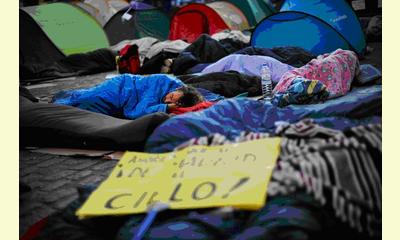|
|
An Impression of the Youth Democracy Movement in Spain
an article by Suvi
Recently I visited Madrid in Spain on holiday and witnessed
demonstrations of young people in the center of the city. The
demonstrators had been sleeping outside in tents in the Prado area to
protest the policies of the banking industry. As I walked through the
city center, I noticed that many of the ATM machines had red paint and
slogans written on them. In addition, in front of the Ministry of
Finance, I saw a painted slogan that said “No one represents us!” I am
sure that the young people had something to do with the existence of
these new paint creations. 
click on photo to enlarge
While
the demonstrators were still asleep, the sanitation workers came to
erase some of the paint. They seemed annoyed to have their pictures
taken while cleaning the paintings.
The protesters blamed the
banks and other financial institutions for economic policies that caused
the economic recession. The young persons said that after the banks
were bailed out with taxpayer money the government and the financial
institutions did not adopt any alternative strategies to avoid a repeat
of the financial chaos. The demonstrators also stated that they wanted
to create a real democracy which represented their interests and not
the interest of the financial institutions.
The demonstrators
came from many different parts of the country, walking in some cases
several hundred kilometers. They were a diverse group – some
unemployed, others students, and yet others who were working. People
who sympathized with the young protesters and shared their ideals also
joined their ranks.
Some demonstrators stated they planned to
walk to Brussels to express their views and join with other like minded
individuals and groups. They seemed determined to promote change that
will not adversely effect the innocent victims of what the demonstrators
perceived as reckless policies of the banks and other financial
institutions. http://international.democraciarealya.es.
|








|
DISCUSSION
Question(s) related to this article:
The Arab spring of 2011
Can it inspire democratic movements around the world?
Thematic forum(s) in which this article is being discussed:
COMMUNITY DEVELOPMENT - DÉVELOPPEMENT DE LA COMMUNAUTE

|
|
|
This report was posted on August 7, 2011.
If you wish to start a new discussion topic on this article, please copy the title of this article which is An Impression of the Youth Democracy Movement in Spain and its number which is 521 and enter this information along with your discussion question and an introductory response to the question here.

A few stories are retained on the main listings if they are considered
by readers to be a priority. If you have not already done so, please
take the time to check a box below: should this article be considered as
a priority?

|







